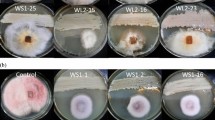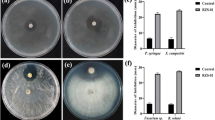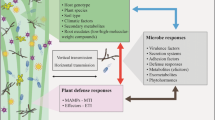Abstract
Aims
The aim of this study was to isolate soilborne AHL degrading actinobacteria that can be used as biocontrol agents against the quorum sensing mediated virulence of Pectobacterium carotovorum subsp. carotovorum BR1 in in vitro and in planta studies.
Methods
Actinobacterial strains capable of N-acyl homoserine lactone (AHL) degradation, Glutamicibacter nicotianae AI5a and Rhodococcus pyridinivorans AI4 were isolated and screened using Chromobacterium violaceum CV026 as a biosensor in an AHL degradation bioassay. The effect of AHL degradation by the potential biocontrol strains was studied by a co-culture assay. Reduction in plant cell wall degrading enzymes produced by PccBR1 due to the quorum quenching activity of the potential biocontrol strains was studied using colorimetric assays. The ability of the isolates to reduce soft rot symptoms was studied in in vitro cucumber and potato maceration assays. A cucumber plant infection model was developed to study blackleg in greenhouse experiments.
Results
G. nicotianae AI5a, R. pyridinivorans AI4 and R. erythropolis CRD13.3C were able to reduce 3-oxo-C6- N-acyl homoserine lactone and production of plant cell wall degrading enzymes by PccBR1. The isolates were also able to prevent and attenuate soft rot caused by PccBR1 in vitro in potato and cucumber maceration assays. The isolates were also able to prevent blackleg in an in planta cucumber infection model.
Conclusions
Among the three actinobacterial isolates, G. nicotianae AI5a showed best results and has immense potential as a biocontrol agent against the virulence of the quorum sensing phytopathogen PccBR1.








Similar content being viewed by others
Abbreviations
- AHL:
-
N-acyl Homoserine Lactone
- PCWDEs:
-
Plant Cell Wall Degrading Enzymes
- Pcc :
-
Pectobacterium carotovorum subsp. carotovorum
- QS:
-
Quorum Sensing
- QQ:
-
Quorum Quenching
- PBS:
-
Phosphate Buffered Saline
- CFU:
-
Colony Forming Units
- PGA:
-
Polygalacturonase
- PNL:
-
Pectin Lyase
- PL:
-
Pectate Lyase
References
Andresen L, Sala E, Koiv V, Mäe A (2010) A role for the Rcs phosphorelay in regulating expression of plant cell wall degrading enzymes in Pectobacterium carotovorum subsp. carotovorum. Microbiology 156(5):1323–1334. https://doi.org/10.1099/mic.0.033936-0
Bais HP (2012) Shoot the messages not the messengers. Plant Soil 358:7–10. https://doi.org/10.1007/s11104-011-1114-2
Baz M, Lahbabi D, Samri S, Val F, Hamelin G, Madore I et al (2012) Control of potato soft rot caused by Pectobacterium carotovorum and Pectobacterium atrosepticum by Moroccan actinobacteria isolates. World J Microb Biot 28(1):303–311. https://doi.org/10.1007/s11274-011-0820-5
Borisova RB (2011) Isolation of a Rhodococcus soil bacterium that produces a strong antibacterial compound. Available via ProQuest Dissertations & Theses Global (918226857). Retrieved from https://search.proquest.com/docview/918226857?accountid=144497
Busse HJ (2016) Review of the taxonomy of the genus Arthrobacter, emendation of the genus Arthrobacter sensu lato, proposal to reclassify selected species of the genus Arthrobacter in the novel genera Glutamicibacter gen. nov., Paeniglutamicibacter gen. nov., Pseudoglutamicibacter gen. nov., Paenarthrobacter gen. nov. and Pseudarthrobacter gen. nov., and emended description of Arthrobacter roseus. Int J Syst Evol Microbiol 66(1):9–37. https://doi.org/10.1099/ijsem.0.000702
Busse HJ, Wieser M (2015) Glutamicibacter. Bergey's Manual of Systematics of Archaea and Bacteria 1–12. https://doi.org/10.1002/9781118960608.gbm01431
Crépin A, Barbey C, Cirou A, Tannières M, Orange N, Feuilloley M, Dessaux Y, Burini JF, Faure D, Latour X (2012) Biological control of pathogen communication in the rhizosphere: a novel approach applied to potato soft rot due to Pectobacterium atrosepticum. Plant Soil 358(1–2):27–37. https://doi.org/10.1007/s11104-011-1030-5
Czajkowski R, Jafra S (2009) Quenching of acyl-homoserine lactone-dependent quorum sensing by enzymatic disruption of signal molecules. Acta Biochim Pol 56(1). https://doi.org/10.18388/abp.2009_2512
Czajkowski R, Perombelon MC, van Veen JA, van der Wolf JM (2011) Control of blackleg and tuber soft rot of potato caused by Pectobacterium and Dickeya species: a review. Plant Pathol 60(6):999–1013. https://doi.org/10.1111/j.1365-3059.2011.02470.x
Czajkowski R, Pérombelon MCM, Jafra S, Lojkowska E, Potrykus M, Van Der Wolf JM, Sledz W (2015) Detection, identification and differentiation of Pectobacterium and Dickeya species causing potato blackleg and tuber soft rot: a review. Ann Appl Biol 166(1):18–38. https://doi.org/10.1111/aab.12166
Des Essarts YR, Cigna J, Quêtu-Laurent A, Caron A, Munier E, Beury-Cirou A et al (2016) Biocontrol of the potato blackleg and soft rot diseases caused by Dickeya dianthicola. Appl Environ Microbiol 82(1):268–278. https://doi.org/10.1128/AEM.02525-15
Dong YH, Zhang XF, Xu JL, Zhang LH (2004) Insecticidal Bacillus thuringiensis silences Erwinia carotovora virulence by a new form of microbial antagonism, signal interference. Appl Environ Microbiol 70(2):954–960. https://doi.org/10.1128/AEM.70.2.954-960.2004
Duarte V, De Boer SH, Ward LJ, De Oliveira AMR (2004) Characterization of atypical Erwinia carotovora strains causing blackleg of potato in Brazil. J Appl Microbiol 96(3):535–545. https://doi.org/10.1111/j.1365-2672.2004.02173.x
Garge SS, Nerurkar AS (2016) Attenuation of quorum sensing regulated virulence of Pectobacterium carotovorum subsp. carotovorum through an AHL lactonase produced by Lysinibacillus sp. Gs50. PloS ONE 11(12). https://doi.org/10.1371/journal.pone.0167344
Garge SS, Nerurkar AS (2017) Evaluation of quorum quenching Bacillus spp. for their biocontrol traits against Pectobacterium carotovorum subsp. carotovorum causing soft rot. Biocatal Agric Biotechnol 9:48–57. https://doi.org/10.1016/j.bcab.2016.11.004
Hadizadeh I, Peivastegan B, Hannukkala A, Van der Wolf JM, Nissinen R, Pirhonen M (2019) Biological control of potato soft rot caused by Dickeya solani and the survival of bacterial antagonists under cold storage conditions. Plant Pathol 68(2):297–311. https://doi.org/10.1111/ppa.12956
Huang W, Lin Y, Yi S, Liu P, Shen J, Shao Z, Liu Z (2012) QsdH, a novel AHL lactonase in the RND-type inner membrane of marine Pseudoalteromonas byunsanensis strain 1A01261. PLoS One 7(10):e46587. https://doi.org/10.1371/journal.pone.0046587
Jafra S, Przysowa J, Czajkowski R, Michta A, Garbeva P, Van der Wolf JM (2006) Detection and characterization of bacteria from the potato rhizosphere degrading N-acyl-homoserine lactone. Can J Microbiol 52(10):1006–1015. https://doi.org/10.1139/w06-062
Kalia VP (2013) Quorum sensing inhibitors: an overview. Biotechnol Adv 31(2):224–245. https://doi.org/10.1016/j.biotechadv.2012.10.004
Kalia VC, Raju SC, Purohit HJ (2011) Genomic analysis reveals versatile organisms for quorum quenching enzymes: acyl-homoserine lactone-acylase and-lactonase. Open Microbiol J 5:1–11. https://doi.org/10.2174/1874285801105010001
Langdahl BR, Bisp P, Ingvorsen K (1996) Nitrile hydrolysis by Rhodococcus erythropolis BL1, an acetonitrile-tolerant strain isolated from a marine sediment. Microbiology 142(1):145–154. https://doi.org/10.1099/13500872-142-1-145
Leadbetter JR, Greenberg EP (2000) Metabolism of acyl-homoserine lactone quorum-sensing signals by Variovorax paradoxus. J Bacteriol 182(24):6921–6926. https://doi.org/10.1128/JB.182.24.6921-6926.2000
Lebecka R, Kistowski M, Dębski J, Szajko K, Murawska Z, Marczewski W (2019) Quantitative proteomic analysis of differentially expressed proteins in tubers of potato plants differing in resistance to Dickeya solani. Plant Soil 441:317–329. https://doi.org/10.1007/s11104-019-04125-7
Lépine F, Déziel E (2011) Liquid chromatography/mass spectrometry for the detection and quantification of N-acyl-L-homoserine lactones and 4-hydroxy-2-alkylquinolines. In: Quorum Sensing, Humana Press, pp 61–69. https://doi.org/10.1007/978-1-60761-971-0_5
Ma X, Schloop A, Swingle B, Perry KL (2018) Pectobacterium and Dickeya responsible for potato blackleg disease in New York state in 2016. Plant Dis 102(9):1834–1840. https://doi.org/10.1094/PDIS-10-17-1595-RE
Maisuria VB, Nerurkar AS (2013) Characterization and differentiation of soft rot causing Pectobacterium carotovorum of Indian origin. Eur J Plant Pathol 136(1):87–102. https://doi.org/10.1007/s10658-012-0140-0
Maisuria VB, Nerurkar AS (2015) Interference of quorum sensing by Delftia sp. VM4 depends on the activity of a novel N-Acylhomoserine lactone-acylase. PLoS ONE 10(9). https://doi.org/10.1371/journal.pone.0138034
Mansfield J, Genin S, Magori S, Citovsky V, Sriariyanum, M, Ronald P, ... and Toth IAN (2012) Top 10 plant pathogenic bacteria in molecular plant pathology. Mol Plant Pathol 13(6):614–629. https://doi.org/10.1111/j.1364-3703.2012.00804.x
McClean KH, Winson MK, Fish L, Taylor A, Chhabra SR, Camara M, Daykin M, Lamb JH, Swift S, Bycroft BW, Stewart GSAB, Williams P (1997) Quorum sensing and Chromobacterium violaceum: exploitation of violacein production and inhibition for the detection of N-acylhomoserine lactones. Microbiology 143(12):3703–3711. https://doi.org/10.1099/00221287-143-12-3703
McGowan SJ, Barnard AM, Bosgelmez G, Sebaihia et al (2005) Carbapenem antibiotic biosynthesis in Erwinia carotovora is regulated by physiological and genetic factors modulating the quorum sensing-dependent control pathway. Mol Microbiol 55(2):526–545. https://doi.org/10.1111/j.1365-2958.2004.04397.x
Miller GL (1959) Use of dinitrosalicylic acid reagent for determination of reducing sugar. Anal Chem 31(3):426–428. https://doi.org/10.1021/ac60147a030
Molina L, Constantinescu F, Michel L, Reimmann C, Duffy B, Défago G (2003) Degradation of pathogen quorum-sensing molecules by soil bacteria: a preventive and curative biological control mechanism. FEMS Microbiol Ecol 45(1):71–81. https://doi.org/10.1016/S0168-6496(03)00125-9
Nedjma M, Hoffmann N, Belarbi A (2001) Selective and sensitive detection of pectin lyase activity using a colorimetric test: application to the screening of microorganisms possessing pectin lyase activity. Anal Biochem 291(2):290–296. https://doi.org/10.1006/abio.2001.5032
Papenfort K, Bassler BL (2016) Quorum sensing signal–response systems in Gram-negative bacteria. Nat Rev Microbiol 14(9):576–588. https://doi.org/10.1038/nrmicro.2016.89
Park SY, Lee SJ, Oh TK, Oh JW, Koo BT, Yum DY, Lee JK (2003) AhlD, an N-acylhomoserine lactonase in Arthrobacter sp., and predicted homologues in other bacteria. Microbiology 149(6):1541–1550. https://doi.org/10.1099/mic.0.26269-0
Park SY, Kang HO, Jang HS, Lee JK, Koo BT, Yum DY (2005) Identification of extracellular N-acylhomoserine lactone acylase from a Streptomyces sp. and its application to quorum quenching. Appl Environ Microbiol 71(5):2632–2641. https://doi.org/10.1128/AEM.71.5.2632-2641.2005
Pirhonen M, Flego D, Heikinheimo R, Palva ET (1993) A small diffusible signal molecule is responsible for the global control of virulence and exoenzyme production in the plant pathogen Erwinia carotovora. EMBO J 12(6):2467–2476. https://doi.org/10.1002/j.1460-2075.1993.tb05901.x
Polkade AV, Mantri SS, Patwekar UJ, Jangid K (2016) Quorum sensing: an under-explored phenomenon in the phylum Actinobacteria. Front Microbiol 7:131. https://doi.org/10.3389/fmicb.2016.00131
Põllumaa L, Alamäe T, Mäe A (2012) Quorum sensing and expression of virulence in Pectobacteria. Sensors 12(3):3327–3349. https://doi.org/10.3390/s120303327
Ravn L, Christensen AB, Molin S, Givskov M, Gram L (2001) Methods for detecting acylated homoserine lactones produced by Gram-negative bacteria and their application in studies of AHL-production kinetics. J Microbiol Methods 44(3):239–251. https://doi.org/10.1016/S0167-7012(01)00217-2
Rumbaugh KP (Ed.) (2011) Quorum sensing: methods and protocols. Humana Press, New York
Russell DW, Sambrook J (2001) Molecular cloning: a laboratory manual (Vol 1, p 112). Cold Spring Harbor Laboratory, Cold Spring Harbor
Silpe JE, Bassler BL (2019) Phage-encoded LuxR-type receptors responsive to host-produced bacterial quorum-sensing autoinducers. MBio 10(2):e00638–e00619. https://doi.org/10.1128/mBio.00638-19
Uroz S, Chhabra SR, Camara M, Williams P, Oger P, Dessaux Y (2005) N-Acylhomoserine lactone quorum-sensing molecules are modified and degraded by Rhodococcus erythropolis W2 by both amidolytic and novel oxidoreductase activities. Microbiology 151(10):3313–3322. https://doi.org/10.1099/mic.0.27961-0
Uroz S, Oger PM, Chapelle E, Adeline MT, Faure D, Dessaux Y (2008) A Rhodococcus qsdA-encoded enzyme defines a novel class of large-spectrum quorum-quenching lactonases. Appl Environ Microbiol 74(5):1357–1366. https://doi.org/10.1128/AEM.02014-07
Uroz S, Dessaux Y, Oger P (2009) Quorum sensing and quorum quenching: the yin and yang of bacterial communication. Chem BioChem 10(2):205–216. https://doi.org/10.1002/cbic.200800521
von Bodman SB, Bauer WD, Coplin DL (2003) Quorum sensing in plant-pathogenic bacteria. Annu Rev Phytopathol 41(1):455–482. https://doi.org/10.1146/annurev.phyto.41.052002.095652
Yates EA, Philipp B, Buckley C, Atkinson S, Chhabra SR, Sockett RE, Goldner M, Dessaux Y, Cámara M, Smith H, Williams P (2002) N-acylhomoserine lactones undergo lactonolysis in a pH-, temperature-, and acyl chain length-dependent manner during growth of Yersinia pseudotuberculosis and Pseudomonas aeruginosa. Infect Immun 70(10):5635–5646. https://doi.org/10.1128/IAI.70.10.5635-5646.2002
Yoon SH, Ha SM, Kwon S, Lim J, Kim Y, Seo H, Chun J (2017) Introducing EzBioCloud: a taxonomically united database of 16S rRNA gene sequences and whole-genome assemblies. Int J Syst Evol Microbiol 67(5):1613–1617. https://doi.org/10.1099/ijsem.0.001755
Zamani M, Behboudi K, Ahmadzadeh M (2013) Quorum quenching by Bacillus cereus U92: a double-edged sword in biological control of plant diseases. Biocontrol Sci Tech 23(5):555–573. https://doi.org/10.1080/09583157.2013.787046
Acknowledgements
University Grants Commission (UGC, India) is acknowledged for providing Research Fellowship in Science for Meritorious Students under Basic Scientific Research Scheme (BSR-RFSMS) towards support of the laboratory work.
Author information
Authors and Affiliations
Corresponding author
Additional information
Responsible Editor: Matthew G. Bakker.
Publisher’s note
Springer Nature remains neutral with regard to jurisdictional claims in published maps and institutional affiliations.
Electronic supplementary material
ESM 1
(PDF 149 kb)
Rights and permissions
About this article
Cite this article
Vesuna, A.P., Nerurkar, A.S. Biocontrol impact of AHL degrading actinobacteria on quorum sensing regulated virulence of phytopathogen Pectobacterium carotovorum subsp. carotovorum BR1. Plant Soil 453, 371–388 (2020). https://doi.org/10.1007/s11104-020-04623-z
Received:
Accepted:
Published:
Issue Date:
DOI: https://doi.org/10.1007/s11104-020-04623-z




